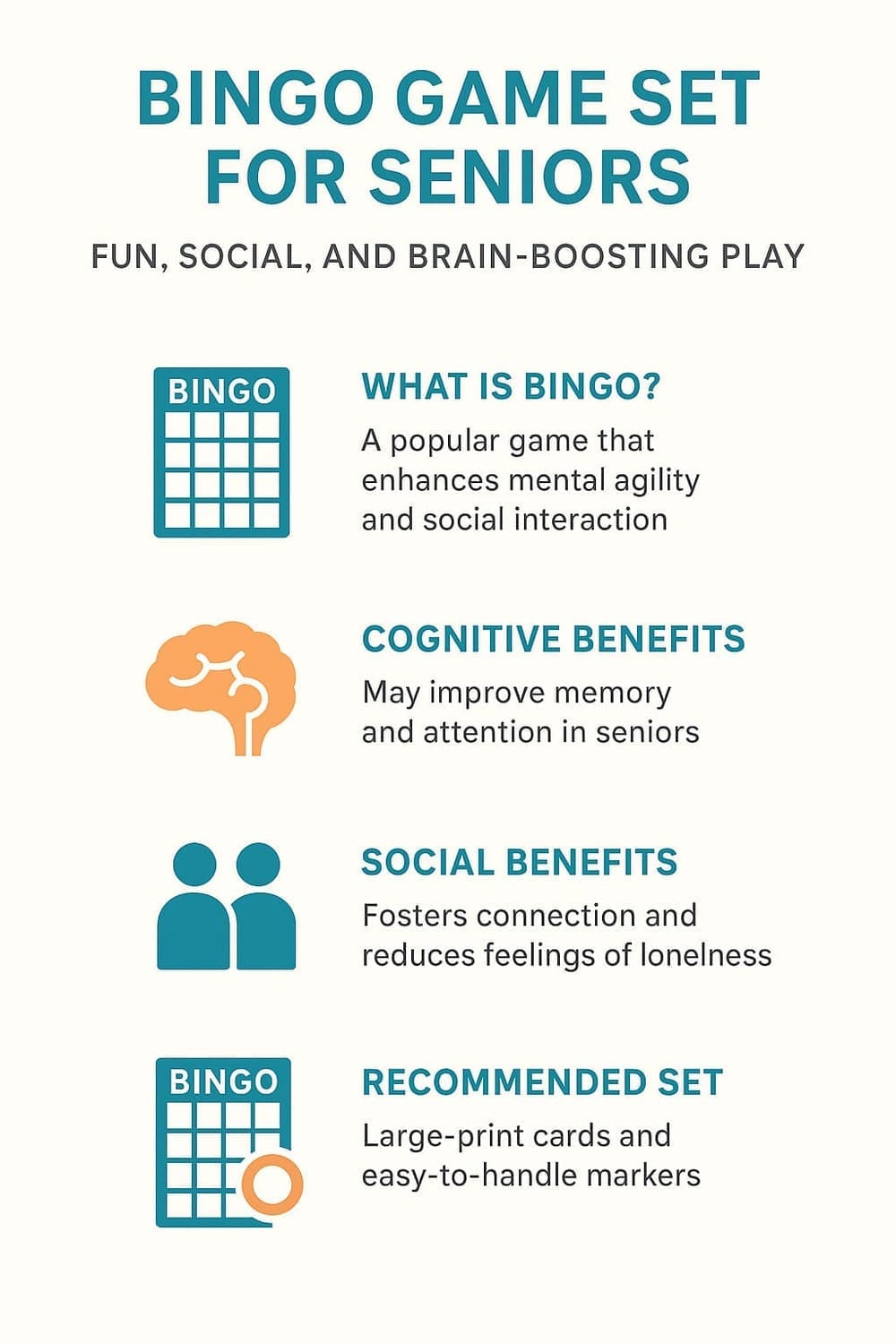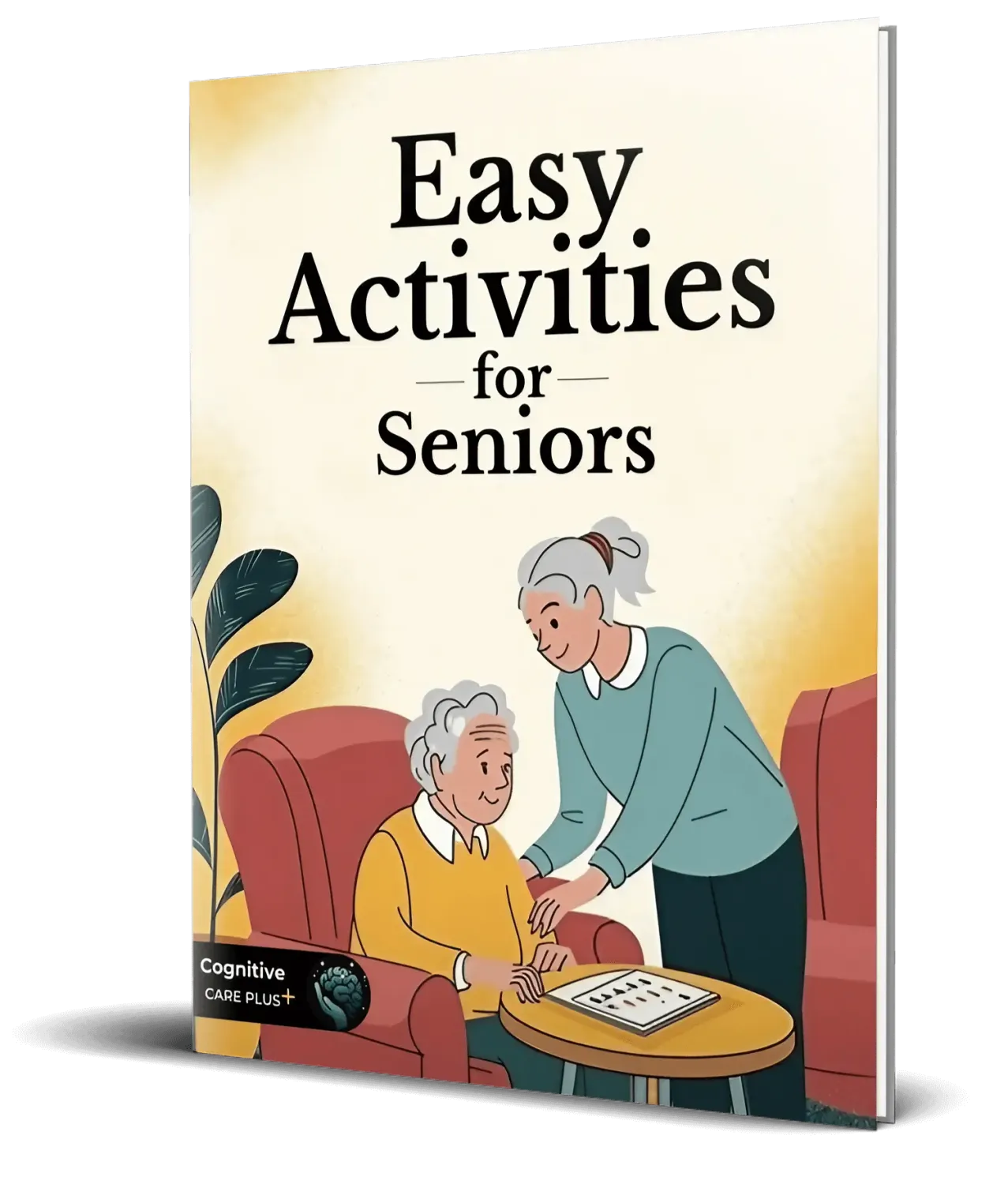Bingo Game Set for Seniors: Fun, Social, and Brain-Boosting Play
Have you ever seen the spark in someone’s eyes when they shout “Bingo!”?
For many seniors, bingo is more than just a game—it’s a chance to laugh, connect, and keep the mind active. A bingo game set can turn an ordinary afternoon into a lively, brain-boosting experience that strengthens social bonds and stimulates memory.
Whether you’re a family caregiver or an activity coordinator in a senior center, the right set can make all the difference.
🎧 Prefer to listen instead? Tap below to play our podcast episode and explore how bingo can spark mental agility, strengthen social bonds, and add joy to everyday life for seniors. In just a few minutes, you’ll hear simple tips to make each game more engaging and meaningful.
✨ Enjoyed the episode?
Subscribe to the Cognitive Care Plus Podcast for practical guides, expert insights, and compassionate support to help you care for your loved one with dementia.
Why Bingo Is a Perfect Activity for Seniors

From a neuropsychological perspective, bingo is a workout for the brain. It engages:
Attention – Players must listen carefully for numbers.
Working memory – Remembering which numbers were called and where they are on the card.
Processing speed – Quickly marking numbers before the next call.
Socially, it’s a proven way to reduce feelings of isolation—something many seniors face. The friendly competition, shared laughter, and familiar rhythm of the game make it easy for everyone to join in, even those with mild cognitive decline.
Enjoy a quick visual guide to playing bingo that makes joining the fun even easier. Watch the simple steps and see how easy it is to get started!
Choosing the Right Bingo Game Set for Seniors
Not all bingo sets are the same. Picking the right one ensures comfort, accessibility, and enjoyment. You can explore our full guide to bingo game sets for recommendations, tips, and the best options for seniors.
Accessibility and Ease of Use
Look for large-print bingo cards that are easy to read, even for those with vision challenges.
Consider bingo slide cards—these allow players to cover numbers without fumbling with loose chips, making them perfect for individuals with arthritis or limited dexterity.
Variety of Game Formats
Switching formats keeps things fresh. Along with the classic 75-ball game, try musical bingo or themed cards for holidays and special events. For example, using songs from the 1950s can trigger joyful memories and encourage conversation.
Durability and Portability
If you run frequent sessions, choose a bingo set made from sturdy materials that can withstand repeated use. Portable sets are ideal for caregivers who want to bring the fun home or to a small gathering.
Cognitive Benefits of Bingo for the Elderly
Bingo is more than a pastime—it’s a form of cognitive stimulation therapy.
Regular play can:
Enhance concentration and attention span.
Support short-term memory recall.
Encourage visual scanning skills.
Neuropsychologists highlight that games like bingo may help maintain neuroplasticity—the brain’s ability to form new connections—even in older age.
A recent systematic review published in Alzheimer’s & Dementia found that more socially active older adults developed dementia an average of five years later than those less engaged, with a 38% lower risk of dementia and a 21% lower risk of mild cognitive impairment.
In addition, a quasi-experimental study presented at the Sigma Theta Tau International Nursing Research Congress showed that older adults with dementia who played bingo over seven consecutive weeks experienced significant improvements in memory, thinking, orientation, language, and command.
Making Bingo More Engaging
Adding Music Bingo for Extra Fun
Music bingo swaps numbers for song clips. When a familiar tune plays, players find it on their card. For seniors, especially those with dementia, music can unlock deeply stored memories and create a joyful atmosphere.
Creative Bingo Prizes for Seniors
The right prize can make a game even more exciting. Consider:
Puzzle books or memory games for adults.
Potted plants or small flowers.
Snacks that fit dietary needs.
Cozy lap blankets.
These rewards are not just incentives—they can also promote comfort and well-being.
How to Organize a Bingo Session for Maximum Enjoyment
Set the mood with good lighting and a comfortable room temperature.
Keep it relaxed—announce numbers at a steady pace and take short breaks.
Add personal touches—celebrate winners with applause or a small ceremony.
I remember organizing a game for my mother, who had mid-stage Alzheimer’s. At first, she seemed unsure, but after a few rounds, her smile was radiant. The familiar rhythm of bingo gave her comfort, and the group’s laughter made her feel part of something bigger.
Final Thoughts
A bingo game set isn’t just about winning—it’s about creating moments of joy, connection, and mental engagement. Whether you choose a traditional set or add a twist with music bingo, you’ll be giving seniors an activity that nourishes both mind and heart.
So, next time you’re planning an activity, bring out the bingo cards—you might just create the highlight of someone’s week.
🩵 Want more free tools to make caregiving smoother? Join our list and get practical resources delivered to your inbox.
FAQ
1. What is the best bingo game set for seniors?
Look for a set with large-print cards, sturdy pieces, and easy-to-use markers or slide cards. Durability and readability are key.
2. How does bingo help elderly people mentally?
It boosts memory, attention, and processing speed while also encouraging social interaction.
3. What are bingo slide cards and why are they useful?
They’re cards with built-in sliding windows to cover numbers, eliminating the need for small chips—ideal for those with dexterity issues.
4. How can music bingo benefit seniors with dementia?
Music can stimulate emotional memory, improve mood, and encourage participation even in later stages of cognitive decline.
5. What are good bingo prizes for seniors?
Useful, enjoyable items like puzzle books, plants, healthy snacks, or cozy blankets work well.
👉 Looking for more engaging ideas for seniors? Explore all our categories to find activities, sensory tools, and brain-boosting resources for every stage of dementia care.
Share this article:
If this article helped you, share it with other caregivers who need encouragement.
💬 We’d love to hear from you!
Have you ever played bingo with your loved one or organized a game for a senior group? What version did you use—classic, musical bingo, or another twist? Share your tips, favorite moments, and even the challenges you’ve faced in the comments below. Your story could inspire another caregiver to bring more joy and connection into someone’s day.

Trending
Simple tools that make caregiving...
Turning simple play into a brain-boosting activity...
Here’s what to look for when choosing...

About me

Hi there 👋 My name is George Cassou, I'm a psychologist and the creator of this blog. Inspired by my journey caring for my mom with Alzheimer's, I share activities and tips to bring joy and connection.

Affiliate Disclosure:
This website contains affiliate links. If you click on these links and make a purchase, we may earn a small commission at no additional cost to you. These commissions help us keep this site running and allow us to continue creating helpful content to support caregivers and families.


